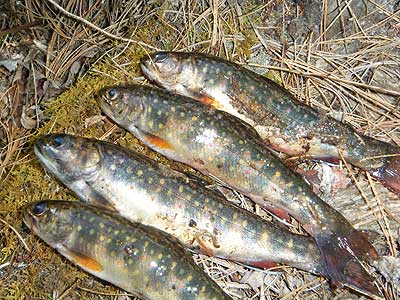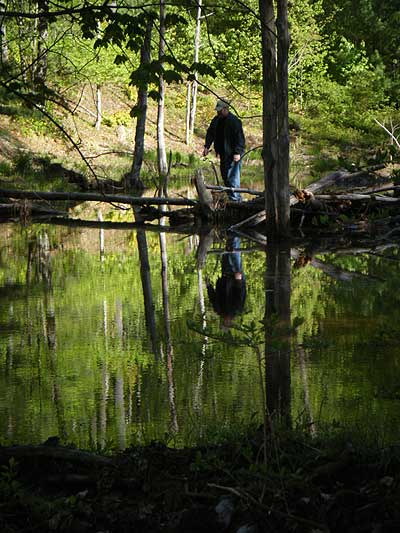New Hampshire Nature Notes
by Eric Orff
Reflections of wild trout and passing on traditions.
Wednesday 05/12/2010


A couple of days ago I went trout fishing with my son in a local wild place where native brook trout still lurk in the shadows of a chilly spring-fed brook. It sent my mind back to my youth and a story I wrote four years ago about fishing for native brook trout. So join me for a trip backwards in time.....................
Catching the Spirit of the Native Brook Trout
Step by step I skulked through the alders, easing my way to the edge of the cold spring-fed brook. I stalked in the way of a native trout fisherman. I did not throw my shadow into the brook to spook my weary prey that sunny late spring day. Each step propelled me further backward in time – 1990…1980…1970…1961 (age 11). The words of my father echoed in my mind; “walk softly, stay low, don’t let you shadow creep into the water, swing the worm and gently place it just above that submerged log…”
My father knew the ways of the native brook trout. Knowledge had been passed down from generations before and he had a lifetime of practicing his skills. My father grew up in Downeast Maine before the great depression and was the oldest of a large family typical of the times. He had perfected the art of catching the elusive native brook trout to treat the family with a delicious meal. I listened intently for years to his descriptions of the ways of the trout. Luckily as a youngster in northern Maine, and later as a teen in rural New Hampshire, I got to p[practice my skills often.
Wherever I have lived the spirit of the native brook trout has lingered in the shadows of the quiet, gentle flowing brooks – some without names. Following in my father’s footsteps was natural as I sought the spirit of the trout. There is so much to learn, sense, feel, hear and smell in the recesses of a forgotten stream. Discoveries are at every bend on a newly fished brook. A pond above a new beaver dam will surely contain the biggest trout of the day. An old mill site leaves you listening for voices from the past lingering in the winds whispering through the pine tops. A familiar brook changes relentlessly; a new fallen tree here, a shadow there. A rain shower can completely change the mood of a brook overnight.
Native brook trout are small elusive creatures. In the spring-fed brooks I have fished all my life the natives were usually only three to seven inches long. The minimum length limit was six inches. As a boy growing up in Maine, a six inch ruler always dangled from my woven ash fishing basket. I would catch a lot of trout before adding a dozen keepers to my basket. I lined it with moss in anticipation of feeling the wriggling trout as I dropped them through the port in the top of the basket.
A native brook trout is the sweetest tasting fish I know. I also think they are, by far, the most handsome. A native brook trout can only be described as the color of a beautiful sunset. Their white belly shines like the last rays of sunlight on a perfect day. The reds and pinks of the edges of their fins and belly merge into the dusky color of their sides almost unnoticed, like the last pinkish glow if the day turning into night. Wavy shadows ripple along their sides speckled with brilliant red dots, that catch your eye like evening stars before the transition into the blackness of night, spilling down their sides from the back. And like the universe itself, the spirit of the native brook trout is unfathomable.
A trout is as quick as lightening. In a flash, a trout will appear out of nowhere, grab your worm and disappear into a tangle of roots, stripping your hook of its worm and leaving you hopelessly tangled. To fish for natives you must stay on the edge. No mistake is forgiven. Though a trout prefers the deep, dark shadows of an undercut banking or log they can hide almost anywhere. A gentle set of riffles, even in the shallowest of brooks, will do.
The spirit of the native brook trout is far more than the fish themselves/. I can sense not only the spirit of the trout in the humid yet cool air beneath the alders and pines, but I sense the spirit of my father as well. Sometimes it’s the distant drumming of a woodpecker, or the melodic organ-like piping of a wood thrush. Like the brook, the spirit is ever changing, always alive, but sometimes as elusive as the trout.
One winter I summoned the courage to search my mother’s garage for the old steel telescoping fishing pole my father had carefully tucked away, probably several years before his death in 1996. When I found it, I knew it was time to bring it back to life.
I’m sure this rod is nearly fifty years old. My sister discovered the old rod about twenty years ago in a closet in the house where my father was born in 1923. He cherished the old rod as I do now. The simple black crank reel has stood the test of time. Despite its worn appearance the spool still fits snugly. The pearly white know on the crank does show its age as it wobbles when I turn it softly – click, click, click.
…Quietly I neared the banking of the brook. Slowly I extended the metal rod, first the top section slid out, then the middle section – a little brown with rust. The black reel on the cork handle payed out my line in a steady click, click, click. Each click ratcheted my mind backwards in time as the years clicked away. I was as excited as a kid as I crept forward. Slowly, slowly I swung toe rod over the brook, relaxed my grip on the line and gently let the worm swing like a pendulum into the spirit of the native brook trout.
The worm gracefully landed on the edge of the shadow cast by the undercut banking. I wondered, “Was it far enough?” The telltale rattle shimmying up the fishing line soon set the tip of the steel pole quivering. The fish, with a series of taps on the line, telegraphed the answer to me. The taps soon transcended the rod and quivered the cork handle in my hand. I sensed the grip of my father from the last time a native trout quivered this handle. My eyes quickly glistened.
